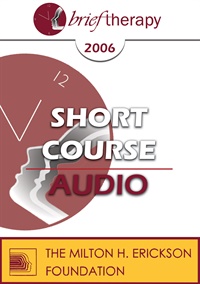
- Average Rating:
- Not yet rated
- Topic Areas:
- Short Courses | Psychotherapy | Brief Therapy | Therapist Development
- Categories:
- Brief Therapy Conference | Brief Therapy Conference 2006
- Faculty:
- Ana Almeida Melikian, MA
- Duration:
- 1:18:24
- Format:
- Audio Only
- Original Program Date:
- Dec 07, 2006
- Short Description:
- This course aims to provide a compass that helps to navigate within the different models of psychotherapy. This instrument comes in the form of a useful scheme with several levels: metaphysical, theoretical, technical and practical. Some classical models are going to be presented. Examples will be given of how to apply it to a model that the therapist recently became acquainted with, and time will be dedicated to reflect on our own clinical models.
- Price:
- $15.00 - Base Price
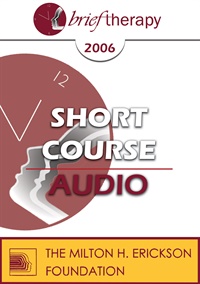
- Average Rating:
- Not yet rated
- Topic Areas:
- Short Courses | Brief Therapy | Tailoring | Therapeutic Relationship | Therapist Development
- Categories:
- Brief Therapy Conference | Brief Therapy Conference 2006
- Faculty:
- Scott Shimabukuru, PhD | Les Blondino, LPC, LMFT
- Duration:
- 1:14:03
- Format:
- Audio Only
- Original Program Date:
- Dec 07, 2006
- Short Description:
- Even a very thoughtful therapeutic strategy can leave a client and therapist spinning their wheels with much effort and little progress. It is very easy then for both to try something new only to inadvertently do more of the same. Participants will learn the methods of the therapeutic u-turn which includes lateral thinking and tailoring of a new objective. Lecture, slides and video tape examples will be used to illustrate points.
- Price:
- $15.00 - Base Price

- Average Rating:
- Not yet rated
- Topic Areas:
- Short Courses | Supervision | Therapist Development | Ericksonian Hypnosis and Therapy Techniques | Brief Therapy
- Categories:
- Brief Therapy Conference | Brief Therapy Conference 2006
- Faculty:
- David Barnum | Marne Sherman, PhD
- Duration:
- 1:19:30
- Format:
- Audio Only
- Original Program Date:
- Dec 07, 2006
- Short Description:
- Supervisors often find themselves in the role of "supervisor" because they have been identified as good clinicians, but typically have little formal training in supervision. While clinical skills are essential, the application of those skills in supervision can be quite unique. This workshop will focus on the application of Ericksonian principles to the practice of supervision at various levels of clinical development. Practical and ethical aspects of supervision also will be discussed.
- Price:
- $15.00 - Base Price
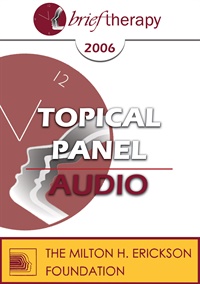
- Average Rating:
- Not yet rated
- Topic Areas:
- Topical Panels | Brief Therapy | Humor | Therapist Development
- Categories:
- Brief Therapy Conference | Brief Therapy Conference 2006
- Faculty:
- Steve Andreas, MA, NLP | Jon Carlson | Betty Alice Erickson, MS, LPC, LMFT | Matthew Selekman, MSW
- Duration:
- 58:58
- Format:
- Audio Only
- Original Program Date:
- Dec 08, 2006
- Short Description:
- BT06 Topical Panel 05 - Use of Humor in Brief Therapy - Steve Andreas, MA, Jon Carlson, PsyD, EdD, Betty Alice Erickson, MS, Matthew Selekman, MSW
- Price:
- $15.00 - Base Price
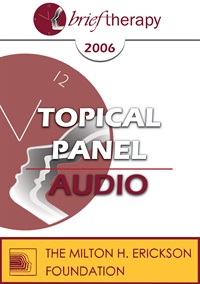
- Average Rating:
- Not yet rated
- Topic Areas:
- Topical Panels | Brief Therapy | Therapist Development
- Categories:
- Brief Therapy Conference | Brief Therapy Conference 2006
- Faculty:
- Ellyn Bader, PhD | Jeffrey Kottler, PhD | John C. Norcross, PhD | Ernest Rossi, PhD
- Duration:
- 56:31
- Format:
- Audio Only
- Original Program Date:
- Dec 08, 2006
- Short Description:
- BT06 Topical Panel 10 - Person of the Therapist - Ellyn Bader, PhD, Jeffrey Kottler, PhD, John Norcross, PhD, Ernest Rossi, PhD
- Price:
- $15.00 - Base Price
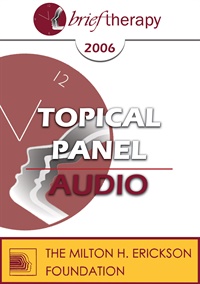
- Average Rating:
- Not yet rated
- Topic Areas:
- Topical Panels | Brief Therapy | Goals of the Therapist | Therapist Development
- Categories:
- Brief Therapy Conference | Brief Therapy Conference 2006
- Faculty:
- Stephen Gilligan, PhD | Pat Love, EdD | Scott Miller, PhD | John C. Norcross, PhD
- Duration:
- 1:00:19
- Format:
- Audio Only
- Original Program Date:
- Dec 08, 2006
- Short Description:
- BT06 Topical Panel 11 - Setting Goals in Brief Therapy - Stephen Gilligan, PhD, Pat Love, EdD, Scott Miller, PhD, John Norcross, PhD
- Price:
- $15.00 - Base Price
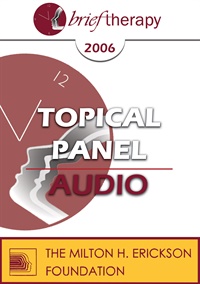
- Average Rating:
- Not yet rated
- Topic Areas:
- Topical Panels | Brief Therapy | Therapist Development
- Categories:
- Brief Therapy Conference | Brief Therapy Conference 2006
- Faculty:
- Steve Andreas, MA, NLP | Mary Goulding, MSW | Frances Vaughan, PhD | Jeffrey Zeig, PhD
- Duration:
- 1:03:23
- Format:
- Audio Only
- Original Program Date:
- Dec 08, 2006
- Short Description:
- BT06 Topical Panel 12 - Essential Aspects of Brief Therapy - Steve Andreas, MA, Mary Goulding, MSW, Frances Vaughan, PhD, Jeffrey Zeig, PhD
- Price:
- $15.00 - Base Price
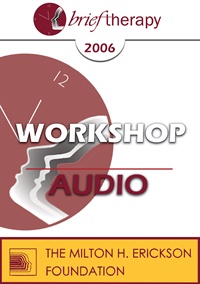
- Average Rating:
- Not yet rated
- Topic Areas:
- Workshops | Brief Therapy | Psychotherapy | Therapist Development | Self-Care
- Categories:
- Brief Therapy Conference | Brief Therapy Conference 2006
- Faculty:
- John C. Norcross, PhD
- Duration:
- 2:38:22
- Format:
- Audio Only
- Original Program Date:
- Dec 09, 2006
- Short Description:
- Conducting brief therapy places additional and special burdens on the person of the therapist. This workshop puts the Socratic dicta of "know thyself" and "heal thyself" into practice. We shall focus on 12 self-care strategies that are clinician-recommended, research-based and practitioner-tested. Come join us for focused lectures, copious handouts, group demonstrations, thought experiments, interactive discussions and participants' own material.
- Price:
- $15.00 - Base Price
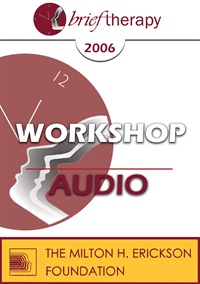
- Average Rating:
- Not yet rated
- Topic Areas:
- Workshops | Brief Therapy | Therapist Development
- Categories:
- Brief Therapy Conference | Brief Therapy Conference 2006
- Faculty:
- Jeffrey Kottler, PhD
- Duration:
- 2:20:33
- Format:
- Audio Only
- Original Program Date:
- Dec 10, 2006
- Short Description:
- Helping people to change is the easy part, relatively speaking; the really tough job is to make the changes last. Many people with chronic, intractable problems - those with addictions, personality disturbances, behavioral problems, unhealthy lifestyles - manage to make some progress and meet initial goals. Bet alas, the changes are not maintained. This is not only discouraging for clients but frustrating for clinicians.
- Price:
- $15.00 - Base Price
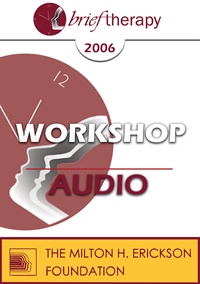
- Average Rating:
- Not yet rated
- Topic Areas:
- Workshops | Art and Creativity | Brief Therapy | Therapist Development
- Categories:
- Brief Therapy Conference | Brief Therapy Conference 2006
- Faculty:
- Peggy Papp, ACSW
- Duration:
- 2:03:39
- Format:
- Audio Only
- Original Program Date:
- Dec 10, 2006
- Short Description:
- The experience of feeling "stuck" is a common hazard of our profession and leaves therapists searching for creative solutions. Clinical creativity is never a solo process but always interactive, inseparable from the imagination and creativity of the clients. It is easy for therapists to get bogged down in literal definitions of problems that go counter to clients' idiosyncratic logic. This workshop will explore different ways of breaking through impasses by looking "outside the box" and changing the frame of reference from the literal to the world of personal meaning. Video tapes will demonstrate the use of metaphors, rituals, fantasies, writing and paradox in making a creative leap.
- Price:
- $15.00 - Base Price
Please wait ...

